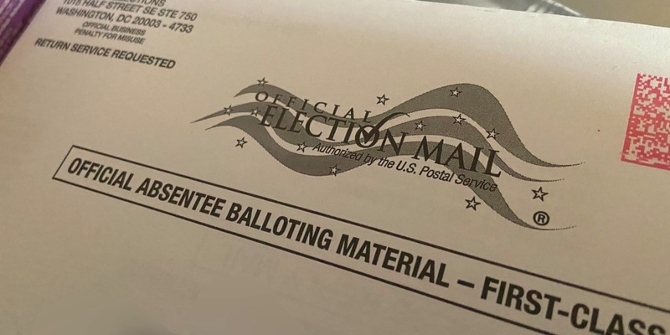 With the end of the first 100 days of the Biden Administration, what progress has been made in reforming America’s criminal justice policy? As part of our Building Back Better series, Nicola Lacey writes that President Biden is moving to fulfil his election campaign promises with a range of criminal justice reforms including drug sentencing reform, robust gun controls, reforming juvenile justice, tackling violence against women, humanizing prison conditions, and eliminating cash bail. And while some of Biden’s reform agenda may be blocked by Congress, pandemic recovery measures will be able to provide the basis for policy initiatives geared towards a broad, long-term approach to social crime prevention.
With the end of the first 100 days of the Biden Administration, what progress has been made in reforming America’s criminal justice policy? As part of our Building Back Better series, Nicola Lacey writes that President Biden is moving to fulfil his election campaign promises with a range of criminal justice reforms including drug sentencing reform, robust gun controls, reforming juvenile justice, tackling violence against women, humanizing prison conditions, and eliminating cash bail. And while some of Biden’s reform agenda may be blocked by Congress, pandemic recovery measures will be able to provide the basis for policy initiatives geared towards a broad, long-term approach to social crime prevention.
The long shadow cast by George Floyd’s May 2020 killing at the hands of a police officer fell across the closing months of last year’s presidential election campaign, highlighting the challenges which criminal justice policy would pose to an incoming Democratic administration. Foremost are institutional racism and other structural injustices which so often turn American criminal justice into a tool of oppression; a penal system unique among wealthy democracies in its scale and intensity; exceptionally high levels of interpersonal violence, notwithstanding the crime decline of the late 1990s and 2000s; a deep polarisation in attitudes to crime and punishment which complicates the political landscape; and a limited array of tools available to federal government to tackle these issues. As the first 100 days of the Biden administration drew to a close, the challenge was thrown into further sharp relief by the second-degree murder conviction of the police officer who killed Mr. Floyd – an outcome of historic significance, welcomed both within and beyond the Black Lives Matter movement for its acknowledgment of the outrageous injustice which had been committed, yet one with a limited immediate upshot for the broader systemic problems faced by the American criminal justice system.
Well before George Floyd’s murder – but, of course, very much informed by the dismal roll of similar cases which preceded it – the Biden Campaign had formulated its proposed criminal justice policy. In a striking departure from Joseph Biden’s past record of taking tough ‘law and order’ positions, it had done so in refreshingly ambitious and progressive terms. Biden’s election Campaign manifesto undertook to ‘rebalance’ American criminal justice around four core principles: an aspiration to reduce the number of people incarcerated while also reducing crime; to root out racial, gender and income-based disparities; to reorient the system towards redemption and rehabilitation; and to put an end to criminal justice services becoming a source of profit either through private prisons or other practices including bail and electronic monitoring.
An ambitious criminal justice reform agenda
In terms of policy priorities, the campaign made it clear that Biden envisaged a decisive move towards social crime prevention. This would be a broad, long-term approach to crime reduction through improving educational opportunities, health (including mental health) services, and housing, while offering financial incentives to states to reduce their reliance on imprisonment in favour of investment in crime prevention. In short, it envisaged a significant rebalancing of the roles of the penal and welfare states. It also voiced Biden’s support for a range of criminal justice-specific reforms including abolishing custodial sentences for drug offences alone in the federal system; abolishing mandatory minimum sentences and the death penalty; establishing robust gun controls; reforming juvenile justice; tackling violence against women; humanizing prison conditions; better funding public defence services; and eliminating cash bail as a means of reducing the criminalization of poverty.
In terms of the mechanisms through which the Biden campaign envisaged implementing this broad strategy, there was again an ambitious agenda: a commitment to legislative change, for example on sentencing; to using the financial power of the federal government to incentivise changes at state level; and to reviving and reinvigorating the use of a range of executive powers deployed during the Obama era, but restricted by the Trump administration. These included a moderating use of the presidential power of clemency; a more proactive use of the Department of Justice’s investigatory and oversight powers, including the revival of pattern-or-practice investigations and consent decrees to address systemic failings in policing; and the use of Task Forces to review policy in key areas, including, specifically, the governance of prosecution discretion.
Early signals from the Biden Administration
These early signals about the mechanisms which Biden envisaged using were particularly significant, given the well-known constitutional limits on federal criminal justice power. The vast majority of criminalising and penal power in the US system lies at state or indeed local – city or county – level. Moreover, absent decisive control of Congress, it is extremely difficult for an administration to push through the legislative reforms, such as financial packages, which can provide indirect means of shaping policy in the exceptionally decentralised American system. This, of course, does not mean that presidents have no power to shape criminal justice, as the legacy of a number of post-War administrations – President Johnson’s Law Enforcement and Assistance Act, President Nixon’s and President Reagan’s fateful War on Drugs – reminds us. But, assuming incomplete control of Congress, it takes a combination of strategic inventiveness, political will and indeed personal determination for presidents to have a significant impact. What are the early signals about how far Joseph Biden will display these qualities and commitments? And what further developments might we hope for in the coming weeks and months?

“No Justice No Peace” (CC BY-SA 2.0) by chaddavis.photography
The first signal that President Biden’s commitment to criminal justice reform has not been eclipsed by immediate pressures such as those exerted by the pandemic came just a few days after the Inauguration, with the signing of an executive order prohibiting the Department of Justice from renewing or entering into any further contracts with private prison companies. A few days later, the Department of Justice itself rescinded a Trump-era memo ordering prosecutors to seek the harshest sentences, reinstating their discretion to make decisions on the individual merits of each case. Then, as the first hundred days neared their end, Attorney General Merrick Garland announced sweeping Department of Justice investigations into, first, the tactics of the police in Minneapolis following the murder of George Floyd and, a few days later, policing in Louisville, Kentucky, over the fatal shooting in March 2020 of Breonna Taylor during a police raid of her home. The significance of such investigations is that they look not merely at individual misconduct but at patterns of practice, and at background questions such as training, resources and governance which may contribute to unconstitutional practice. Such investigations can lead to consent decrees whose implementation can be monitored, with the further possibility of moving to direct Department of Justice control in case of failure to reform. Interestingly, given the acute sensitivities about state and local autonomy from federal control, these two Task Forces have been welcomed not only by activists but by local Mayors and even police departments.
Biden’s commitment to legislative reform, though barriers remain
In terms of legislation, too, President Biden’s commitment has been restated – notably in his call on the day on which Derek Chauvin was convicted for Congress to pass the George Floyd Justice in Policing Act 2020. He repeated that call in his first speech to Congress on the eve of his hundredth day in office, announcing plans for a further $1.8 trillion stimulus package for families and education. The fact that that policing reform legislation remains blocked in the Senate is, of course, a reminder of the structural barriers to such change for any administration without decisive control of both Houses. But in this respect, the devastating human and social consequences notwithstanding, the pandemic has allowed one glimmer of hope. It has opened the political door to substantial economic recovery packages, including the £1.9 trillion stimulus package which has already passed through Congress, providing a basis for several of the important policy initiatives geared towards social crime prevention and the expansion of opportunities envisaged in Biden Campaign statements. These range across job creation, poverty-reduction, education (not least by reinstating incarcerated people’s access to federal financial aid for undergraduate students in the form of Pell Grants), housing, mental and physical health care and the provision of community support services, as well as removing Trump-era restrictions on access to business loans for those with criminal records. Much will depend, however, on how these funds are ultimately deployed at state and local levels.
The coming months will establish how far President Biden is able to build on this promising start in the criminal justice field, and several further potential initiatives could make a significant difference to his likely progress. To take one example, the American Bar Association is pressing the Administration to build on its campaign commitment by taking decisive institutional steps to reshape the presidential power of clemency. Their proposal is that supervision of the power should be moved from the Department of Justice to a new, independent Clemency Commission – a move which would both depoliticise the power, and (in part hence) make it possible to use it in a more pro-active, systematic and even-handed manner. So restructured, the clemency power could be a vehicle to realise the Biden Administration’s policy aspirations in areas such as moderated sentencing of drug offenses and reversing mandatory sentencing laws at the federal level, by applying clemency not merely to individuals but to whole categories of case.
A huge amount remains to be accomplished. But some first steps towards a less inhumane and biased system have been taken.
Please read our comments policy before commenting.
Note: This article gives the views of the authors, and not the position of USAPP – American Politics and Policy, nor the London School of Economics.
Shortened URL for this post: https://bit.ly/3bcHTCi
About the author
 Nicola Lacey – LSE Department of Law
Nicola Lacey – LSE Department of Law
Nicola Lacey is LSE School Professor of Law, Gender and Social Policy. From 1998 to 2010 she held a Chair in Criminal Law and Legal Theory at LSE; she returned to LSE in 2013 after spending three years as Senior Research Fellow at All Souls College, and Professor of Criminal Law and Legal Theory at the University of Oxford. She has held a number of visiting appointments, most recently at Harvard Law School. She is an Honorary Fellow of New College Oxford and of University College Oxford; a Fellow of the British Academy; and was a member of the Board of Trustees of the British Museum from 2015-2019. In 2011 she was awarded the Hans Sigrist Prize by the University of Bern for outstanding scholarship on the function of the rule of law in late modern societies and in 2017 she was awarded a CBE for services to Law, Justice and Gender Politics.






